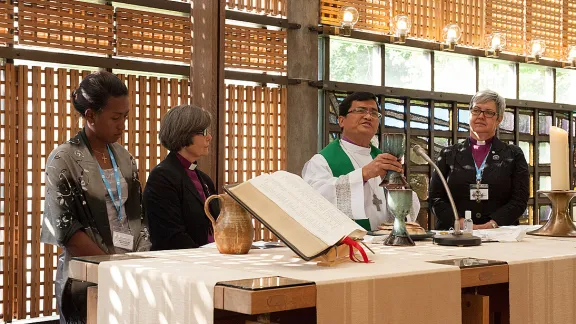
Opening worship at the LWF Council meeting. Photo: LWF/Helen Putsman
The opening of the 2015 Council meeting of the Lutheran World Federation started on an unexpectedly high note before moving to a more sober tone.
Two of the vice-presidents are celebrating their birthday today. As such, the entire plenary hall of 100 Council members, officers, guests, advisers and other participants sang happy birthday for National Bishop Susan Johnson, of the Evangelical Lutheran Church in Canada, and Presiding Bishop Dr Alex Malasusa of the Evangelical Lutheran Church in Tanzania.
LWF President Bishop Dr Munib Younan then gave special recognition to four guests: the coordinator of the upcoming LWF assembly, Church of Norway’s Rev. Dr Kjell Nordstokke, and the Church of Sweden’s Margareta Grape and the Rev. Prof. Dr Cristina Grenholm.
He then invited Phyllis Brewah of the Evangelical Lutheran Church in Sierra Leone to update on the Ebola outbreak.
In describing the spread of the disease from the east of the country westward, she said the lack of official heeding of warnings, inability to contain the disease, lack of personal protection equipment and inability to act promptly cost lives.
While the epidemic has since lessened in severity, the impact on the economy and social fabric of the country was still immense. She paid tribute to the LWF Communion and the church in Sierra Leone’s partner synod NLCA (the Evangelical Lutheran Church in America) that were working in partnership with the church to treat and contain the disease. She gave special thanks to General Secretary Martin Junge for calling her personally to see how she was coping at the height of the outbreak.
“Thank God for being here. It has not been easy. It has been worse than 11 years of civil war. For war, you can see the enemy. But with Ebola, you cannot see the enemy. What makes the disease spread so fast is denial both on behalf of the people and the government.”
Bishop Younan said that as a communion, the Council would hold the people of Sierra Leone in its prayers. “We feel the danger and the seriousness and thank the members of the communion who have helped at this time.”
Wonderful international communion service
The opening meeting followed a wonderful international communion service led by Bishop Aaron Yap from Malaysia.
Bible readings were read in English and French and the sermon was preached by presiding Bishop Helga Byfuglien from the Church of Norway.
The Council meets under the theme “Hope does not Disappoint.” In her sermon, Bishop Helga reminded the Council that “the symbol of hope is an anchor. It is hope that anchors us so we do not get away from him who created us. He is the anchor who keeps us.”
Hope is a powerful force to help us face the everyday. Our hope and longing for the future also has an impact on how we live and work in the world today, she said.
The service included several hymns and songs in German, Portugese, Oshiwambo (Namibia) and English, included communion and ended with a benediction in Chinese read by Bishop Yap.
The Council meeting lasts until 22 June and will cover prominent issues such as the sustainability of the Federation and issues of self-understanding.
The plight of refugees around the world and the churches' response
One of the focus areas of LWF General Secretary Junge’s report to the Council was the plight of refugees in many places in the world and the role of the church advocating for these individuals who all have a name, who all have a face. Junge said, that if we do not get this right, we are facing a moral bankruptcy. He also stressed that the Communion is not an end in itself but if it is a Communion in Christ, it will be a serving communion.
See more on Junge’s report here.
Representatives from several LWF regions responded to the report.
On migration, Bishop Dr Tamás Fabiny said it not only touched the global South but also Europe. Given it was sometimes difficult to follow the way in which governments dealt with migration, LWF members needed the guidance of the LWF.
Dr Junge’s report also prompted Council members to voice their thanks for the work of the communion on global issues.
National bishop Susan Johnson, of the Evangelical Lutheran Church in Canada, thanked him for highlighting not just the work of the Communion Office but of the communion as a whole, saying “statistics are human beings with their tears dried off”. “You helped us see past statistics to the real work and the real people.”
Recognition by the UNHCR to the LWF for service in times of crisis gave Phyllis Brewah of the Evangelical Lutheran Church of Sierra Leone reason for gratitude. “We are as a communion in the right direction. This has always been the case with the LWF.” Once, the LWF was the first faith-based organization to “come to the rescue” of the country after the civil war. Now, it has come to the aid of Sierra Leone and Liberia during the Ebola crisis. “I want to take this opportunity to always be there as a communion and proclaim the Gospel as we believe it. Even if we are in a crisis our hope in God and salvation in Jesus Christ will not fail us.”
Titi Malak of The Lutheran Church of Christ in Nigeria said her church appreciated the accompaniment of the communion as evidenced through the visit of the General Secretary at a time when the activities of Boko Haram were at its peak.
Gloria Rochas from the Evangelical Lutheran Church in Chile – reflecting on the Council theme in the context of the General Secretary’s report – said that we have good reason to have hope and faith and to share this and that the Communion is important in giving churches a framework for acting.
Council 2015: more information


